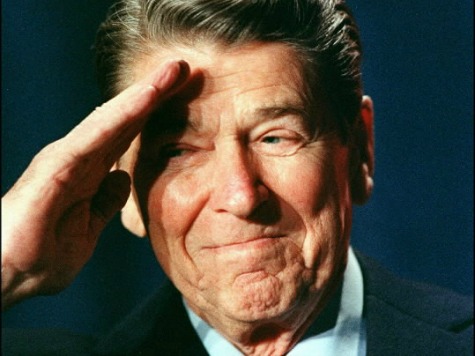In the last debate, President Obama hit Governor Romney for wanting, “…to import the foreign policies of the 1980s.” This period was a formative time for Mr. Obama, age 51, and myself, age 50. While a college student then, Obama called the Reagan military build-up a “distorted priority” that was the result of a “twisted” view of the world that heightened the threat of war. I had a different reaction to Reagan’s efforts: I joined the Army.
What was really at stake in the 1980s came to the fore recently during the pedestrian task of grabbing a sandwich to eat at my desk at the Texas Public Policy Foundation. At the sandwich shop I heard the original 1983 German version of “99 Red Balloons.” Immediately, memories of the time referenced by the President flooded my memories–this song and I had a complicated relationship 29 years ago. Listening to the New Wave pacifist song was a guilty pleasure. Hitting #2 on the charts, Nena’s “99 Luftballoons” protested America’s military buildup to defend the West against Soviet communism. Its English language lyrics included, “Now it’s all over and I’m standin’ pretty, In this dust that was a city”–essentially advocating the “Better Red than dead” line.
I fretted about the inherently wrong message this popular song transmitted–as if we could disarm and keep our freedom in the face of tyranny. I openly wondered how many of my fellow young Americans would hold fast against the Soviet threat as just the year before California voters approved a Soviet-inspired nuclear freeze initiative by 52% to 48%. My own college campus voted to make itself a “nuclear-free zone”–as if the Soviet Union would take note and retarget their intercontinental ballistic nuclear missiles.
In 1983, Ronald Reagan was two years into his two terms as President, straining mightily to counter the growing Soviet nuclear menace in the face of mounting pacifism at home and in Western Europe. Germany was divided between East and West, and 600,000 Germans protested against Reagan’s push to modernize NATO’s intermediate-range nuclear deterrent as a counter to the rapidly proliferating Soviet SS-20 tri-tipped nuclear missile.
1983 was the year we first successfully rolled back communism on a tiny island in the Caribbean called Grenada.
1983 was also the year I signed up to do my part in the Cold War on behalf of liberty; I enlisted in the U.S. Army Reserve and would eventually go on to earn a commission and become a lieutenant colonel.
This widespread popular unrest over rearmament was goaded along by much of popular culture. We now know, after the Soviet intelligence archives were opened up after their collapse in 1991, that the Soviet Union itself actively encouraged Western opposition to self-defense.
President Reagan’s genius was his understanding of people. He knew that the center of gravity of the Western democracies was majority opinion–not merely strength of arms. Reagan’s master stroke was to call out the Soviet Union by suggesting that all nuclear weapons be abolished as immoral instruments of indiscriminate destruction.
The Soviets ridiculed Reagan’s suggestion. Even U.S. military planners were horrified–after all, how could the outgunned NATO forces defeat the far larger Red Army without resort to the use of tactical nuclear weapons? (We actually had thousands of 8-inch nuclear artillery shells in our arsenal then.)
But Reagan understood people and politics. He also knew that the rapidly-advancing state-of-the-art in technology–what is now known as the revolution in military affairs–would render large masses of Soviet armor obsolete. So, he went through with the build-up and modernization of our nuclear arsenal in Europe and in the U.S. and was able to keep our allies on board. The end result was a treaty agreement with the Soviet Union in 1988 that eliminated an entire class of nuclear weapons followed three years later by the dissolution of the Soviet Union itself.
As a college student, President Obama opposed President Reagan’s policies–the same ones he linked Governor Romney to in the last debate.
Chuck DeVore is Vice President of Communications for the Texas Public Policy Foundation and served as a State Assemblyman in California from 2004 to 2010.He was a Reagan White House appointee in the Pentagon and is a lieutenant colonel in the U.S. Army (retired) Reserve.

COMMENTS
Please let us know if you're having issues with commenting.